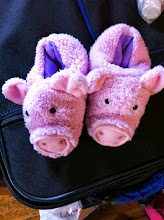On the list of things that always make me cry is the Chicken Soup for the Soul books. Combine that with the mind-boggling account of the reformation of a Food Nazi...and it gives me hope for the human race. I wish this sort of thing happened more frequently.
--------
"How to Sidestep an Elephant"
Our family has some unwritten rules about being healthy and stoic. So when my sister, Maggie, was diagnosed with diabetes in 1981, we didn't talk about it much.
Back then, she was 24 and lived in Manhattan. I lived in Boulder, CO. No none else in our family had diabetes, neither did anyone we knew. On the few occasions that she did bring up her frustrations with finger pokes and and worries about complications, I didn't know what to say. All my time and training as a psychiatric social worker- not to mention years of experience as a "bossy" older sister-seemed to fly out the window.
Just a few months after my sister was diagnosed, my father died, and I began to have melancholy thoughts about Maggie. I saw myself sitting beside her in kidney dialysis unit waiting to see if our tissues would match. In my most depressing moments, I imagined myself alone in her apartment, sorting through her closet and choosing moments to give to her closest friends.
Of course, I said nothing about my fear to Maggie. We both began to treat her diabetes as a topic to be dismissed as quickly as possible. I assumed she would tell me everything she wanted me to know about diabetes, and she assumed I didn't want to hear much about it. (In retrospect, I see that she was right.)
We let diabetes become, in mental health parlance, the elephant in our living room- a huge obstacle we tried to tiptoe around while pretending it didn't exist. I made promises to myself that I would do some reading about it on my own. While working at a VA Medical Center, I had access to a well-stocked library, but I never went near the Endocrinology shelf. It wasn't an entirely conscious decision,facing my fears would mean that I had them.Instead, I told myself that I'd get around to it wehen I had more time.
When Maggie and I were together, usually around the holidays, the older sister in me kept her under survelliance by paying close attetion to what she was eating. This was the part about diabetes that I was sure I understood.I cringed everytime I saw her put a piece of chocolate into her mouth, then reminded myself that she was a bit girl now and it was none of my business.
In 1992 my husband and I moved to the North Island of New Zealand. Maggie came for a Christmas visit, and we planned a New Year's Day outing: We'd take a jet boat up the Wanganui River and hicke a short distance.
That country is rugged, sparsely populated, and remote, so the day of the trip, we packed a lunch. As we drove to our starting point on the river, my sister announced that she was feeling funny and asked my husband to pull over so she could get a snack. When he did, we realized we had left the picnic basket at home.
For a moment, we all panicked. We were miles from a store and nearly two hours from home. We spotted a house and knocked on the door. The woman who answered offered to make Maggie a sandwich. Our guide was with us, and Maggie drank the milk he he had bought to serve with afternoon tea.
The crisis was quickly averted, but that day I realized I had no idea what might have happened if we hadn't found food. It was time to confront that elephant in my living room.
I read a book about diabetes. Not only did the treatments start to make sense, but understanding how far knowledge and technology had advanced gave me hope. For years, my outdated fears had gotten in the way of an honest, ongoing dialogue with my sister.
Now I can ask my sister real questions about diabetes. She has welcomed the opportunity to explain not only what she does to take care of herself, but what having diabetes means in her life. I even went with her once to the ophthalmologist. I listed as she described her blurred vision, and he told her she would need laser treatment right away. She was frightened, and so was I. But I'd read about the success rate of these treatments and was optimistic. I told her so and gave her a hug.
These days, we're still geographically far apart, but emotionally,we're much closer. We're in this together. We both know its mostly up to her, but I'm here whenever she calls.
She's told diabetes doesn't feel like such a lonely illness anymore. That's true for me, too.
-Nowell King
(excerpt from Chicken Soup for the Soul living with Diabetes,2003)
Subscribe to:
Post Comments (Atom)





1 comment:
I've never read the Chicken Soup books (although I bought one of the first ones way, way back and just never got around to reading it). Thanks for posting that excerpt. I enjoyed reading it.
Post a Comment